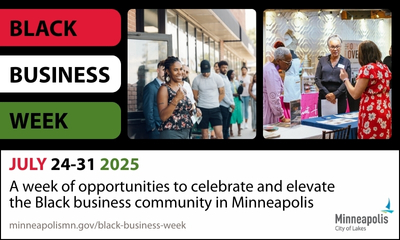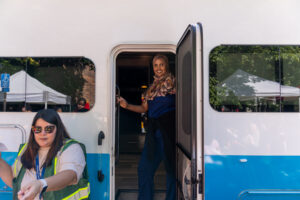
Family nurse practitioner Muna Farah at the Minneapolis Public Health vaccine clinic on Aug. 30, 2024, at Corcoran Park.
(Photo/Dymanh Chhoun/Sahan Journal)
BY DEBRA KEEFER RAMAGE
New school year, hot news items
Our last Education column was out the first of March 2024 (so remember it was written in February.) Just days after that, many important education news items inundated the local media. So I’m going to cover most of that “in case you missed it,” but first here are some more current items.
It’s election season; let’s kick off with the “tech levy” question for Minneapolis Public Schools (MPS) on the ballot Nov. 5. It’s called a “tech” levy, but it’s bigger than just computers and AV, and encompasses all things related to operations, including staff costs and infrastructure. Please vote Yes for this! It will increase the tech levy from its current level of around $18 million to around $38 million. It will be in effect for 10 years and will raise your property tax only $1 to $8 per month.

Driver William Dockers, pictured Aug. 23, 2024, drove one of the first electric school buses for Osseo during the 2023-2024 school year. (Photo/Aaron Nesheim/Sahan Journal)
Breaking news in September: MPS board member Faheema Feerayarre, who represented District 3 in South Minneapolis, resigned too late to get a special election replacement candidate on the upcoming ballot, so the school board will be appointing a replacement for the term, which runs through January, 2027.
More breaking news (I hope it’s not even bigger by the time you read this) is a measles outbreak in area schools. As of mid-September, the countywide case count was 51. The first outbreak was in August at an Islamic religious school (unnamed), and by September there was another, in an MPS elementary school (also unnamed.) Sahan Journal has an in-depth piece on this, including a table tracking immunization levels at all schools. See tinyurl.com/DKRatSSP-measles.
Did you know MPS has a data dashboard with every statistic you can think of on every school? Check it out here: publicinsights.mpls.k12.mn.us/transformation/. Also, the MSP website as a whole is a good place to start for following or investigating anything to do with Minneapolis schools. The main link is mpschools.org.
What happened in education locally March through August
We’ll set the stage with the budget crisis facing MPS, as it does nearly all school districts. In early March, MinnPost noted: “Kare 11 reports Minneapolis public schools are expected to have a $110 million budget gap for the 2024-25 school year. ‘In a statement, the district said there are several factors for the gap, including declining enrollment, rising costs and the end of federal COVID-19 funding.’” (See minnpost.com, March 7, by Jazzmine Jackson)
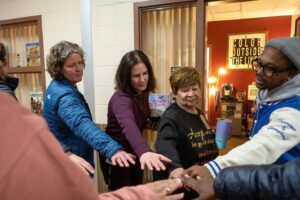
Lucy Laney Principal Lisa Pawelak, center, huddles with other school leaders each morning outside her office. Also pictured: nurse Jessica Findell, nurse Bettie Joseph Smith, student support specialist Morgan McDonald. (Photo/David Pierini/North News)
Other news items in March:
Sahan Journal covered MPS’s course reversal and apology to parents over its short-sighted plan to cut “heritage language” programs in Hmong and Somali. See sahanjournal.com, March 12, by Becky Z. Dernbach.
The first mention was made (several sources) of a School Transformation project in MPS, which you can read about on the MPS website (search for “School Transformation” at mpschools.org.) The project has four parts: a physical space study, priority-based budgeting, increased community input, and a Spanish dual-language taskforce.
MinnPost had a piece supporting the bill then on the floor that would allow indigenous students in Minnesota to use the spiritual practice of smudging in schools with staff supervision, noting that this has shown to benefit their mental health. See minnpost.com, March 7, by Deanna Pistono.
On March 18, Minnesota Reformer had a great piece on Minnesota’s most racially segregated school districts, noting in preface that some of the most segregated districts in the US are in Minnesota. See minnesotareformer.com, March 18, by Christopher Ingraham.
And in the Department of the Bleeding Obvious, MinnPost covered a study that found a high correlation between disability and absenteeism from schools.
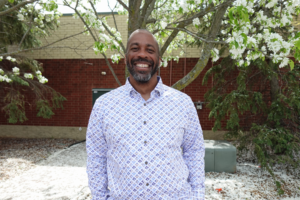
Tracy Byrd, the 2024 Minnesota Teacher of the Year, graduated from Minneapolis’ Washburn High School and returned to teach there. (Photo/Becky Z. Dernbach/Sahan Journal)
In April, Sahan Journal had two more pieces exploring budget cuts in more depth. On April 9, David Pierini covered the story of Lucy Laney Community School, a school in MPS, which was beginning to thrive in 2023, but lost momentum due to budget cuts.
The Anoka-Hennepin system, the state’s largest school district, was the focus of a piece on April 25, by Becky Z. Dernbach. There, a few deeply conservative school board members decided to hold the budget approval process hostage to their project of eliminating diversity and equity initiatives. When the impasse threatened to shut down the whole district, students, parents, and teachers demanded that they decouple the two items and pass the budget. ‘Our voices were actually heard’ said one student activist when they finally prevailed.
In May, Axios Twin Cities ran a great story about the Minneapolis Federation of Teachers’ (MFT 59) raises won vs. the enormous budget gap still present (this was just days before the end of the legislative session.) With MPR online magazine having covered the St. Paul Federation of Educators’ (SPFE) win in March, this means both cities’ educators unions had won historic (and vital) raises in the face of serious funding issues. See mprnews.org for SPFE, and tinyurl.com/DKRatSSP-MFT2024 for the Axios article on MFT.
The legislature did make several improvements to education incomes across the state including MPS. Education Minnesota, which represents most of the educators in the state including all rural and suburban districts and student teachers, summarized education gains at the end of session. These included over $60 million for a new literacy program, over $30 million to boost teacher pensions, a pilot program to pay student teachers, and grants to retain Native and POC educators.
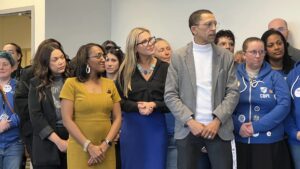
L to R: Minneapolis Public Schools superintendent Lisa Sayles-Adams (yellow dress), then-MFT 59 president Greta Callahan (now a school board candidate) and school board president Collin Beachy at a press conference on the budget. (Photo/Kyle Stokes/Axios)
At the end of the school year, the Star Tribune ran a sweet story about a Roseville High graduating senior who spent her last days in school campaigning for the district to get just one electric school bus for the high school. She addressed the board about available grant money to do this. In August, Sahan Journal ran a bit about 15 Minnesota school districts having attained those same grants and at least 67 electric buses that would be added to the state. They didn’t say where, so I can’t say whether the student managed to persuade Roseville or not.
Also in June, the Hiawatha Academies Workers Union announced that they had just gained and approved a favorable contract after two years of negotiations. Many people hope that unionization can fix some of the problems plaguing charter schools.
What happened in education nationally
Beaufort, SC schools were the focus of a CBS “60 Minutes” program in early March when a book ban attempt there mostly failed. The program covered the infamous group, Moms for Liberty, spearheading nationwide book bans. After 97 books were pulled from libraries (except for one or two that weren’t even there in the first place – sloppy!) the community cooled down and did a review. Only five of the 97 remained banned.
Labor news continues to overlap with education news in a major way. An April 14 article in Labor Notes recounts how in Massachusetts, one of the states still enforcing a law against public employee unions using the strike, a wave of strikes over 20 months had brought significant gains to teachers. See labornotes.org/blogs/2024/03/teaching-each-other-strike. Also, see Rethinking Schools, an excellent magazine available in print or online, for a stirring account in the Spring 2024 issue of the first ever (and successful) teacher’s strike in Portland, OR.

Smudging
Deep dive #1 – what’s the deal with charter schools anyway?
Above I referred to unions being one avenue to fix the problems with charter schools. And what exactly are those problems? Some of us have been following this story for at least a decade, but until recently, it wasn’t something you saw much of in the mainstream media.
Then, in mid-September, the newly-renamed Minnesota Star Tribune ran three articles on charter schools in just four days. All three are by the same pair of reporters, Mara Klecker and Jeffrey Meitrodt. The overall theme was failure: a lofty but possibly naive ideal, founded in Minnesota, was suddenly and messily “failing” all over the place. Although they are well-researched and rich in data, they do tell an oddly slanted story in many ways, at least if you are reading them as a seasoned follower of the anti-”Education Reform” movement, in which many critics consider charter schools part of the so-called reform movement they oppose.
In short, there is a whiff of “blame the victim” going on here, even in the second piece, titled “When Minnesota charter schools fail, vulnerable students pay the price.” This piece paints a picture of students as victims of schools when they close, but fails to ask the questions – aren’t the schools (founders, staff, and community) also victims? And who is victimizing them?

Teacher being comforted by two students upon closing of Upper Mississippi Academy in St Paul
In contrast, the story told by anti-reformists, such as In the Public Interest magazine, and local writers such as Rob Levine, is more complex. They focused more on ideologues, the foundations and billionaires that hold the purse-strings, and the detrimental effect the charters system has on the public education system, rather than identifying individual charters as boogeymen deliberately miseducating children.
Read the Star Tribune articles if you are interested in this topic (you can find free versions of them in the archive: archive.ph/6W7y1, archive.ph/Tafh8, archive.ph/wbB9B) and then, for a more nuanced view, read this piece from 2022 by Rob Levine: (tinyurl.com/DKRatSSP-Levine) or this one from Sahan Journal: Journal (tinyurl.com/DKRatSSP-Sahan-loophole.)
Deep dive #2 – understanding school system finance via a socialist finance nerd
I was delighted when a Signal chat on education I am in turned me on to a podcast: “Have You Heard,” hosted by Jennifer Berkshire and Jack Schneider. This is a smart monthly podcast on public education woes and policies and how to fix them. In particular I was directed to the August edition subtitled “Cut, Fire, Close” which was about school finance and featured a guest speaker named David Backer, the “school finance whisperer.” I didn’t even have to listen to it, because it provided a decent transcript. I made a Google Doc of the transcript which you can read here – tinyurl.com/DKRatSSP-CCFtranscript (It’s very long.)

Lt. Gov. Peggy Flanagan, left, and Rep. Kristi Pursell, DFL-Northfield serving lunch at Greenvale Park Elementary in Northfield on Sept. 3, 2024. (Photo/Michelle Griffith/Minnesota Reformer)
This is all quite relevant to the news items highlighted above. It’s a race to the bottom for schools, with “poor outcomes” being one force among others that leads to dropping public school enrollment, and dropping enrollment leading to less income, and less income putting downward pressure on educators’ pay and education expectations.
One amazing story about the craziness of school finance came from Thief River Falls earlier this year. Charter schools are not the only schools that close! All over the country, districts caught in funding formulas based on enrollment come up against lower birth rates, out migration due to various reasons, rising costs, and voters who refuse to pass levies to fund schools at all. In Thief River Falls, a third-grade class was going to be axed, leading to overcrowding and the loss of a couple of jobs. Elementary school children, led by a teacher, put in thousands of hours making and selling mugs and keychains to successfully raise $70,000 last school year and save the class. MN Reformer covered this story here: minnesotareformer.com/2024/07/02/elementary-students-
fundraise-to-save-classroom-after-voters-reject-levies/. We all desperately need the keys to shutting down this
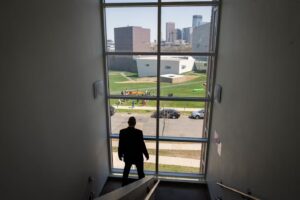
Former Love Works Academy director Don Allen in April 2024
death spiral, and knee-jerk reactions like blaming one kind of school or teacher is not helping.
The Have You Heard podcast led me to David Backer’s substack, where one can dip their geeky toes into the nation’s best wisdom on school finances. See davidibacker.substack.com. Backer says in the podcast that he was very influenced in his youth by Paulo Freire, Brazilian socialist and philosopher of critical pedagogy. Backer became a finance expert because of early struggles with math, and after feeling totally let down by the education system prior to college, he is now practicing his own form of “Pedagogy of the Oppressed” (the title of Freire’s main book) by being an expert on the finances of public education.
Deep dive #3 – Paulo Freire and The Pedagogy of the Oppressed
If you’re already familiar with the Pedagogy of the Oppressed, good for you! For the rest of us, I have plunged into Wikipedia and other sources to check this out, because I have a feeling it is becoming increasingly relevant as two social forces immiserate us. First, and none of this will be news to anyone, the famous American middle class is getting hollowed out at an increasing rate. So more oppressed people here in the good old US of A. Second, through the years we learn ever more about how much oppression there is and how the trauma of poverty and injustice is generational and how it affects the brain.
If, like me, all this is making you want to just read the whole thing, guess what! You can get a free PDF of the entire text at tinyurl.com/DKRatSSP-BookDL1




